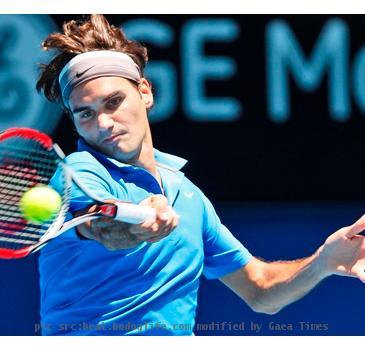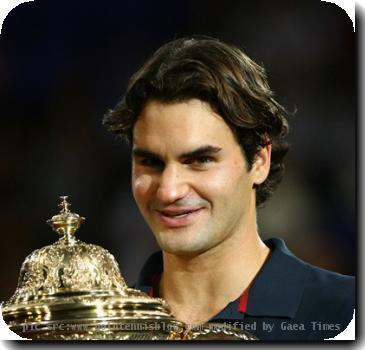Defending champion Federer upset by Soderling in French Open QF, ending Slam SF streak
By Howard Fendrich, APTuesday, June 1, 2010
Federer stunned by Soderling at French Open
PARIS — His French Open reign suddenly over, his record streak of 23 consecutive Grand Slam semifinals done, too, Roger Federer paused briefly as he trudged off court at dusk, acknowledging the fans’ applause with a polite smile and a quick wave.
He’s certainly not used to bidding adieu so soon.
Bothered by the pouring rain and his big-hitting foe, the top-seeded Federer wasted a lead and plenty of openings Tuesday, succumbing to No. 5 Robin Soderling of Sweden 3-6, 6-3, 7-5, 6-4 in the quarterfinals at Roland Garros. If Soderling’s name sounds familiar, it’s because he stunned four-time champion Rafael Nadal in the French Open’s fourth round last year, before losing to Federer in the final.
For the first time in six years, the men’s semifinals at a major tennis tournament will not involve 16-time Grand Slam champion Federer.
“They all come to an end at some stage. You hope they don’t happen, but they do. It was a great run,” Federer said, before injecting a little humor by adding with a wry smile: “Now I’ve got the quarterfinal streak going, I guess.”
Look at it this way: Federer had won 117 matches in a row — 117! — in the first five rounds at majors, dating to a loss to Gustavo Kuerten in the third round at the French Open on May 29, 2004 (Federer advanced twice when opponents withdrew).
“I mean, I respect everyone, but I’m always — how do you say? — I’m honest enough to myself that I know I can win them all,” said Federer, who would cede his No. 1 ranking if Nadal wins the title.
Among the many reasons why Tuesday’s result was so unexpected is that Federer was 12-0 against Soderling, having won 28 of the 30 sets they’d played.
So who, exactly, would have thought Soderling could win three sets in a single day?
Well, Soderling, for one.
“Even though I lost so many times, I always have a chance to win,” said the 25-year-old Soderling, who’d never been past the third round at a Grand Slam tournament until last year’s French Open. “I always believe that I can win. This is a big win, but it’s not the final. Still have at least one more match to play, and I don’t want to celebrate too much.”
That next match will be in Friday’s semifinals against No. 15 Tomas Berdych of the Czech Republic. Still, Soderling has every right to relish what he’s already accomplished: He is the first man to beat the French Open defending champion in consecutive years since another Swede, Mats Wilander, did it in 1984-85.
Nadal, remember, was 31-0 in the French Open until losing to Soderling.
“He’s obviously not afraid of the big moment — or afraid of the big guys,” Wilander said about his countryman. “He’s not intimidated.”
Most are against Federer. Starting at Wimbledon in 2004, one tournament after that loss to Kuerten, Federer had been to the semifinals at every Grand Slam event, a run of 23; the second-longest such streak was 10, by Ivan Lendl and Rod Laver. Federer also had reached the final at 18 of the last 19 majors.
Plus, while Federer might only have one French Open title — he completed his career Grand Slam in Paris in 2009 — that’s thanks to his problems against Nadal. Dating to the start of the 2005 tournament, Federer was 0-4 against his nemesis at Roland Garros, 34-0 against everyone else.
Until Tuesday, that is.
Until Soderling got in the way, putting every last bit of his 6-foot-4, 192-pound frame into powerful forehands that were like thunderclaps, loud and frightening. Driving the ball deeply with shot after shot, Soderling rarely allowed Federer to step into the court, either to cut off angles or to rush forward for volleys. Federer made only 17 trips to the net, 13 fewer than Soderling.
And then there were those Soderling serves, lashed from on high, cutting through the thick air at 130 mph or more, contributing 14 aces and some key service winners, while setting up countless other successful points.
Federer gave Soderling credit for playing well, but also said he thought the damp conditions favored the underdog’s style.
“He was able to hit consistently through the ball on the offensive and put them close to the lines,” Federer said, “and that’s something that was impressive.”
He also knew full well that if he’d played a little better himself, he’d be preparing for another semifinal.
Instead, it will be Soderling vs. Berdych, who advanced to his first Grand Slam semifinal by beating No. 11 Mikhail Youzhny of Russia 6-3, 6-1, 6-2. In Wednesday’s men’s quarterfinals, Nadal meets No. 19 Nicolas Almagro of Spain, and No. 3 Novak Djokovic of Serbia faces No. 22 Jurgen Melzer of Austria.
In Tuesday’s women’s quarterfinals, No. 17 Francesca Schiavone gave Italy its first female semifinalist at the French Open since 1954 by knocking off No. 3 Caroline Wozniacki of Denmark 6-3, 6-2. Schiavone now plays No. 5 Elena Dementieva, who defeated No. 19 Nadia Petrova 2-6, 6-2, 6-0 in an all-Russian quarterfinal.
But Federer-Soderling rendered anything else going on around the grounds Tuesday a mere afterthought.
Federer had a set point at 5-4 in the third, when there was a tremendous exchange. Federer jumped to stop an overhead smash, but Soderling flicked an over-the-shoulder backhand volley winner. Soderling then took the next two points with service winners at 139 mph and 138 mph to hold for 5-5.
With Federer serving at 30-15 in the next game, the first rain delay arrived, delaying play for 75 minutes. When action resumed, Federer went up 40-15 — then proceeded to lose four points in a row, including two missed forehands and a double-fault. Armed with that break, Soderling served out that set with an ace.
“I just missed too many chances today,” Federer acknowledged.
The crowd began pulling loudly for him, cheering each point he won — and jeering Soderling whenever he questioned line calls. Federer broke to go up 2-0 in the fourth set, but just when it seemed he was restoring order, just when it seemed Soderling might crack, that momentum stalled.
Federer missed three shots to help Soderling break back. Then, after another brief rain break, Federer made three unforced errors in a game to get broken again. Ahead 5-4, Soderling served out the match, then walked to the net, pounding his fist on his chest.
Asked which victory was bigger — over Nadal in 2009 or Federer in 2010 — Soderling said: “It’s a tough question. They’re both big wins, of course.”
Of course.
Tags: Europe, Events, France, French Open Tennis Championship, Men's Tennis, Nadia petrova, Paris, Rafael nadal, Roger federer, Western Europe, Women's Sports, Women's Tennis

